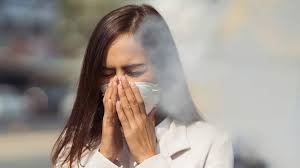
Air Pollution Effect on Heart: The condition of Delhi-NCR areas has become worse due to air pollution. The AQI level has crossed 500, which is extremely dangerous. Due to the poisonous air, it has become difficult for people to breathe. Burning sensation in the eyes, sore throat, cough, all these are common side effects of pollution (Air Pollution Effects on Health), which are being seen in many people, but for those who are already ill or are suffering from any chronic disease, this situation can prove to be even more dangerous.
Recently, a study has revealed that due to air pollution, heart patients are at risk of increasing inflammation, which can worsen this heart condition. Let us know how air pollution can harm the heart (Air Pollution Effect on Heart) and how to take care of heart health at this time.
How does it harm the heart?
Air pollution is caused by PM 2.5 and other harmful gases and chemicals in the air. These small particles can easily enter our blood through breathing and can reach any part of the body. Therefore, pollution can also cause damage to the heart. These particles narrow the blood vessels, increase blood circulation and can weaken the heart muscles. Due to this, the risk of heart diseases, such as heart attack, stroke and heart failure, increases.
- Damage to blood vessels – Air pollution particles damage the walls of blood vessels, which can lead to inflammation and hardening of these vessels. This impedes blood circulation and puts extra pressure on the heart.
- Increases blood pressure- Air pollution can increase blood pressure, which is a major risk factor for heart disease. High blood pressure weakens the heart muscle and also damages blood vessels.
- Weakens heart muscles – Air pollution can weaken heart muscles, increasing the risk of heart failure.
- Heart attack and stroke- Air pollution can increase the risk of heart attack and stroke . It can cause blood clots and block blood vessels.
What should heart patients keep in mind during air pollution?
- Stay indoors- When air pollution levels are high, try to stay indoors. Keep doors and windows closed and use an air purifier.
- Reduce physical activity – When air pollution levels are high, avoid doing intense physical activity.
- Wear a mask – Whenever you go out of the house, always wear an N95 mask.
- Visit your doctor regularly- Keep visiting your doctor regularly and take your medicines on time.
- Eat healthy foods – Eat a diet rich in fruits, vegetables, and whole grains.
- Reduce stress- Stress is a major risk factor for heart disease. Practice yoga, meditation or other stress-reducing techniques .
- Get enough sleep- Getting enough sleep is important for your overall health.
- Do not smoke- Smoking increases the risk of heart diseases.
--Advertisement--

 Share
Share



